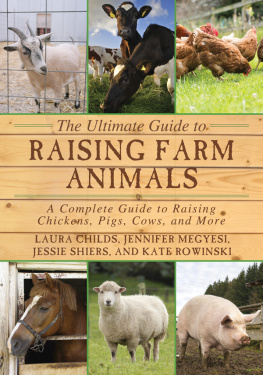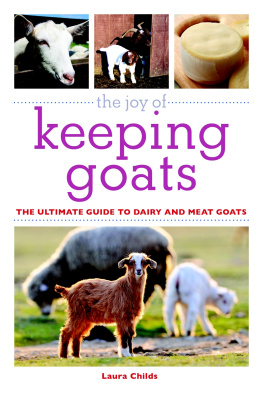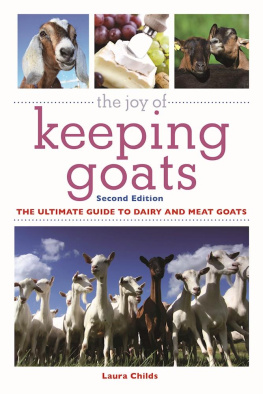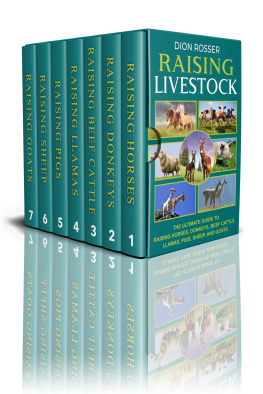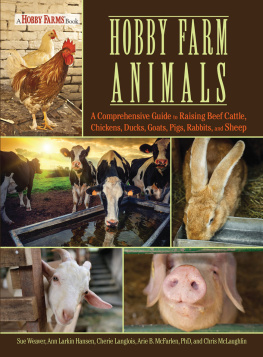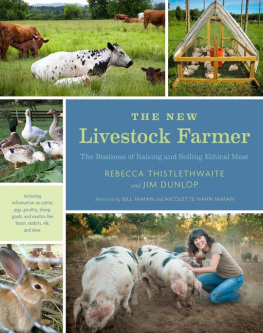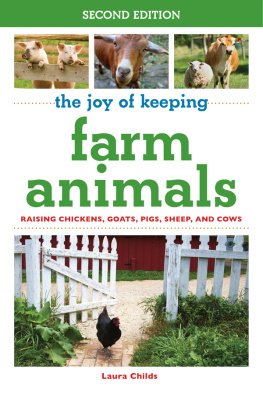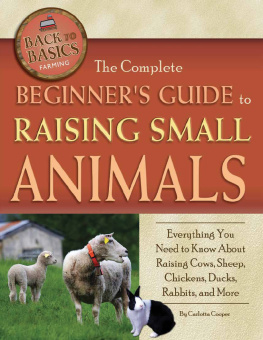Arrangement copyright 2016 by Skyhorse Publishing
Text and images originally appeared in The Joy of Keeping Chickens by Jennifer Megyesi, The Joy of Keeping Horses by Jessie Shiers, The Joy of Birding by Kate Rowinski, The Joy of Keeping Goats by Laura Childs, The Joy of Keeping Farm Animals by Laura Childs, and The Joy of Hobby Farming by Michael and Audrey Levatino.
All rights reserved. No part of this book may be reproduced in any manner without the express written consent of the publisher, except in the case of brief excerpts in critical reviews or articles. All inquiries should be addressed to Skyhorse Publishing, 307 West 36th Street, 11th Floor, New York, NY 10018.
Skyhorse Publishing books may be purchased in bulk at special discounts for sales promotion, corporate gifts, fund-raising, or educational purposes. Special editions can also be created to specifications. For details, contact the Special Sales Department, Skyhorse Publishing, 307 West 36th Street, 11th Floor, New York, NY 10018 or .
Skyhorse and Skyhorse Publishing are registered trademarks of Skyhorse Publishing, Inc., a Delaware corporation.
Visit our website at www.skyhorsepublishing.com.
10 9 8 7 6 5 4 3 2 1
Library of Congress Cataloging-in-Publication Data is available on file.
Cover Photographs: Thinkstock
Print ISBN: 978-1-63450-329-7
Ebook ISBN: 978-1-5107-0112-0
Printed in China
CONTENTS








Introduction
The Search for a Farm
We understand how you feel. We know why youre reading this book. You want to live the country life and enjoy the peace of mind it has to offer. You can imagine yourself enjoying breakfasts of eggs from your chickens and asparagus from your garden and honey from your own bees on your toast. In the winter, you see yourself snug and cozy by your wood-burning stove, warmed by wood from your own forest, that you gathered and split. You might even be wrapped in a knitted blanket made of wool from your llamas or alpacas. But youve got a long way to go before you get there; first things first, you need the farm itself.
Where will your farm be located? To determine this, youll have to think about many more things than the sun and the soil. Youll have to imagine all the possibilities that a location might offer you. Is there sufficient land thats even enoughnot too steepto grow crops? How much sun exposure do all parts of the farm receive throughout the day? Are there fields of healthy grass that would support grazing animals or areas that you could clear for that purpose? Is the soil heavy clay or sandy grit? Are there any water features that might help irrigate a garden or help raise the water table near your farmhouse well? Is there enough forested land to manage a wood lot? As we talk about a sustainable hobby farm in this book, youll see that there are many contributing factors to maintaining a healthy balance on a farm, including water, grass, animals, wood, and your own human spirit. Instead of thinking of your farm as a location, think of it as a living system.
Finding the right farm is both exciting and stressful, but its not harder than any other house search, just different. Youre making a lifestyle change, and because of that, it might feel like a much weightier undertaking. We recommend that you take extra time in your search, even if you have to rent for a while. Because it takes so many years to really work a farm into your own liking, making the correct choice initially is very important. And depending on how quickly you need to get settled, youre limited by the actual farms that are available at the time youre looking.
Generally, the further away from an urban area you get, the more affordable the property values become. But living further out means a longer trip to the grocery, the hardware store, and especially the markets where you might want to sell the fruits of your labor. Because youll likely have an off-farm job, youll want to consider the length of your daily commute as well. If youre an aspiring hobby farmer, some convenience to creature comforts is probably important to you. Today, you can find a location that takes advantage of rural solitude and urban comfort, if thats what you desire.

The view of the garden at Broadhead Mountain Farm from the house. Consider the proximity of the house to the garden, water sources, and outbuildings when purchasing a farm.
Tips for Farm Safety
Wear protective eyewear and earplugs whenever operating machinery, even a lawn mower.
Never operate machinery or a chain saw after having even one drink. Alcohol quickly impairs your judgment.
Wear work gloves and closed-toe boots or shoes when doing any farm work.
Avoid wearing loose clothing when operating machinery of any kind.
Keep fire extinguishers in your kitchen and in your barn.
Never operate heavy machinery or a chain saw without someone else nearby or at least at home that can call for help if you need it.
Keep a first aid kit for humans and also one for your animals.
Post all emergency numbers and contacts clearly on your refrigerator in case someone else needs to call for help for you or if something happens to your animals while you are away. And make sure to share your emergency information with your neighbors.
Create proper fencing and regularly inspect it in order to keep your animals safe.
Keep a calm and assertive demeanor when working around animals.
Study the operators manual of any machine before you use it.
Never walk behind a tractor when the power take-off (the twisting knob on the back of a tractor that powers farm implements) is engaged. Clothing can easily become entangled or debris can be sent flying by cutting equipment.
Always walk your field or lawn before mowing to look for hazards.
Wear a protective face mask when spraying chemicals (even organic ones) or doing yard work to avoid allergy problems.
Get to know your local plants, insects, snakes, and animals so you know which ones to avoid.
Never put up wet hay in a barn. It can combust and is one of the leading causes of barn fires.
Wear sunscreen.
Keep children on a short and painful leash. Well, at least keep a close eye on them and teach them what they should avoid.

Buying tips for first-time animal hobby farmers:
Buy locally and befriend the sellers so you might be able to call them for answers to questions you may have later.

